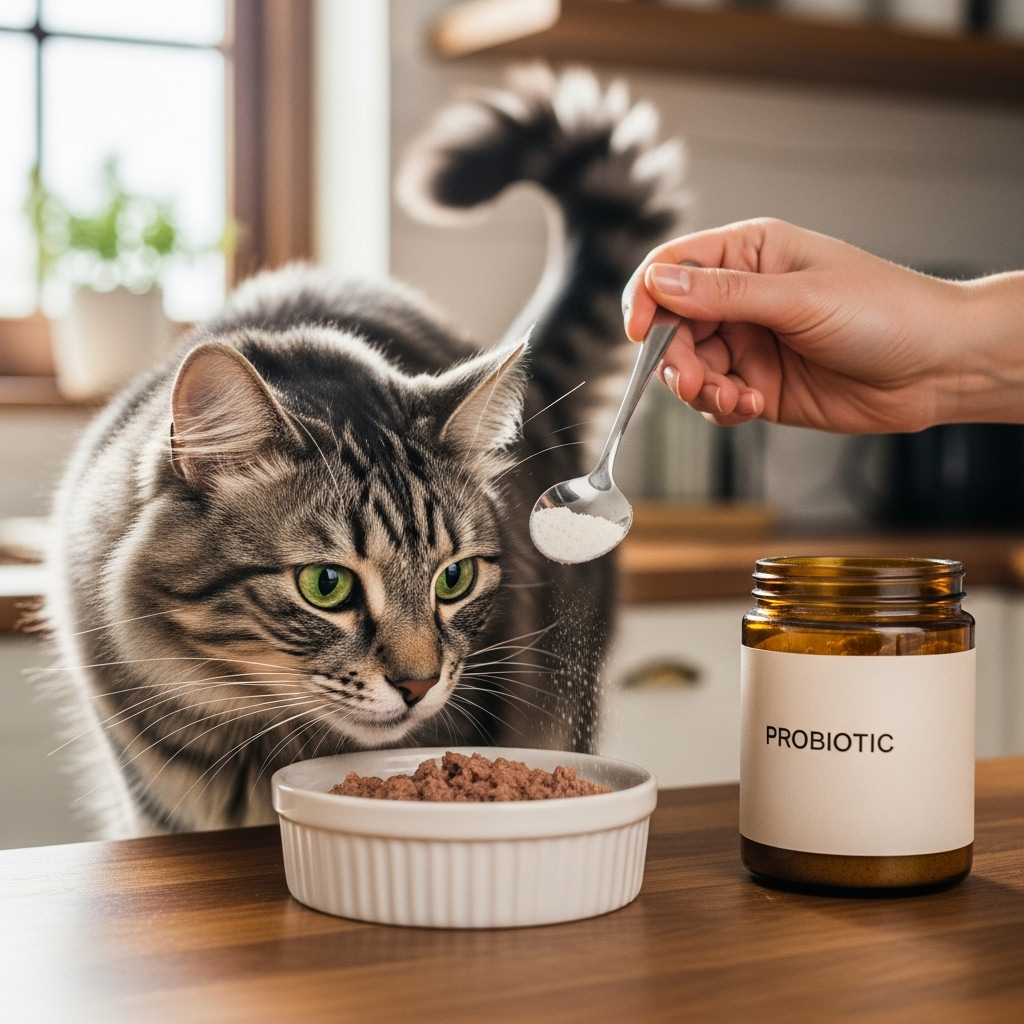Probiotics for Cats With Soft Stool: What to Try First

If your cat has soft stool but is still bright, eating and behaving normally, many owners reasonably want a gentle, low-risk approach before scheduling a vet visit. Probiotics can be a helpful option to support gut health and firm up stools in mild cases. This article explains what probiotics are, which products and strains are commonly used for cats, how to give them, what to watch for, and when to seek veterinary care.
Why soft stool happens even when your cat seems normal
Soft stool (rather than watery diarrhea) can result from many benign causes: a recent diet change, an unusual treat, swallowing grass, mild stress, or minor digestive upset. Parasites, food intolerance, or low-level infections can also cause loose stools but may not immediately change your cat’s behavior. Because many causes are temporary, a short trial of probiotics combined with simple supportive steps is often reasonable for otherwise-normal cats.
What are probiotics and how might they help?
Probiotics are live microorganisms that, when given in adequate amounts, may support the balance of the gut microbiome. In cats with mild, non-progressive soft stools, probiotics can:
- Help normalize stool consistency by supporting healthy digestion and microbial balance.
- Reduce frequency of loose stools in some cats.
- Support recovery after a short course of antibiotics (when used appropriately).
Which probiotic strains and products are commonly used for cats?
Look for products formulated for cats or labeled for companion animals. Common strains included in feline probiotics are:
- Enterococcus faecium — frequently used in pet formulations.
- Various Lactobacillus species (such as L. acidophilus) — may support digestion.
- Bifidobacterium species — sometimes included for gut balance.
- Saccharomyces boulardii — a beneficial yeast often used for occasional loose stool.
Some human probiotics contain similar strains, but dose and formulation matter. Prefer veterinary or feline-specific products when possible. Products come as powders, capsules, chewables, pastes or food toppers. Some need refrigeration; others are shelf-stable—check the label for storage instructions and guaranteed CFU counts.
Prebiotics and synbiotics
Prebiotics are non-digestible fibers that feed beneficial bacteria; synbiotics combine probiotics and prebiotics. These can be helpful but may cause temporary gas in some cats. If your cat is sensitive, start with a probiotic-only product or a low dose.
How to choose and give a probiotic
- Choose a product labeled for cats or for pets, with clearly listed strains and a guaranteed CFU (colony-forming units) at the time of expiration.
- Follow the manufacturer’s dosing instructions. Many feline products provide a low daily dose appropriate for a cat’s size; avoid extrapolating human doses.
- Administer with a small amount of food, or use a palatable gel/paste if available. If using capsules, you can open them and mix the powder into wet food.
- Give probiotics for at least 7–14 days to assess effect. Some cats show improvement in a few days; others may take longer.
What to expect and possible side effects
Most cats tolerate probiotics well. Mild side effects can include temporary gas, slight change in stool consistency, or mild constipation/looser stools during the first few days. If side effects persist beyond a few days, stop the supplement and consult your veterinarian.
When to see the vet
Contact your veterinarian promptly if your cat has any of the following:
- Persistent soft stool for more than 48–72 hours, or symptoms worsening
- Decreased appetite, vomiting, lethargy, fever, or weight loss
- Blood or mucus in the stool
- Very young kittens, elderly cats, or cats with known immune suppression or major health issues
Even if your cat seems normal now, a fecal exam or brief check can rule out parasites or other underlying causes when loose stool repeats or persists.
Practical tips for a safe trial
- Start with a single small dose and watch for reactions over 24–48 hours.
- If your cat is on antibiotics, give probiotics 1–2 hours apart from the antibiotic dose to improve chances the probiotic survives.
- Keep a simple stool log (appearance, frequency) to track improvement.
- Avoid overuse—follow label dosing and consult your vet before long-term use.
Pros and Cons
| Pros | Cons |
|---|---|
| May help firm mild, non-progressive soft stools and support gut health | Not a cure for serious conditions; may not work for all causes |
| Generally well tolerated with few side effects | Some products may be low quality or have incorrect labeling |
| Available in cat-specific formulations and easy-to-give forms | Not appropriate for immunocompromised pets or severe illness without vet approval |
FAQ
Q: How long should I try probiotics before expecting improvement?
A: Many cats show some improvement within 3–7 days, but allow 7–14 days. If there’s no meaningful change or the condition worsens, stop and consult your veterinarian.
Q: Can I give human probiotics to my cat?
A: Some human probiotics contain strains that are similar to those used for pets, but doses and formulations differ. Choose products made for cats or pets when possible, and consult your vet before using a human product.
Q: Are probiotics safe if my cat is on other medications?
A: Generally probiotics are safe with many medications, but timing matters with antibiotics (separate doses by 1–2 hours). Always check with your veterinarian if your cat is on immunosuppressive drugs or has a serious illness.
Q: My cat is acting normal but stool is consistently soft. Do I still need tests?
A: If soft stools continue beyond a few days or recur, a veterinary check (including a fecal parasite exam and health assessment) is recommended to rule out treatable causes.
Key Takeaways
- Probiotics can be a safe, low-risk first step for cats with mild soft stool who are otherwise acting normal.
- Choose a cat-specific or veterinary-formulated product with clearly listed strains and guaranteed CFU.
- Give probiotics for at least 7–14 days and monitor stool and overall behavior.
- Stop and seek veterinary care if the stool worsens, contains blood, or if your cat becomes unwell.
- Consult your veterinarian before giving probiotics to kittens, immunocompromised cats, or pets with serious conditions.
Remember: probiotics may help some cats with mild soft stools, but they aren’t a substitute for veterinary diagnosis when problems persist or other symptoms develop.
Disclaimer: This article is for informational purposes only and does not replace professional veterinary advice. If your cat’s condition is severe, rapidly worsening, or persistent, contact your veterinarian promptly for diagnosis and treatment recommendations.

Leave a Reply